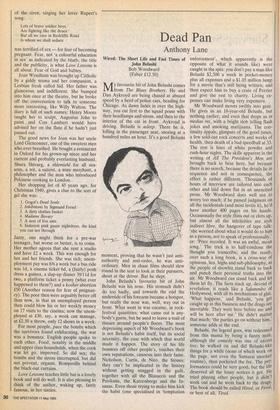Dead Pan
Anthony Lane
Wired: The Short Life and Fast Times of John Belushi Bob Woodward (Faber £12.50)
My favourite bit of John Belushi comes from The Blues Brothers. He and Dan Aykroyd are being chased at absurd speed by a herd of police cars, heading for Chicago. As dawn fades in over the high- way, you cut first to the squad posse with their headlamps and sirens, and then to the interior of the car in front. Aykroyd is driving. Belushi is asleep. There he is, lolling in the passenger seat, snoring at a hundred miles an hour. It's a good Belushi
moment, proving that he wasn't just anti- authority and anti-order, he was anti- ordinary. Men in chase films should slew round in the seat to look at their pursuers, shout at the driver. But he slept.
John Belushi's favourite bit of John Belushi was his nose. His stomach didn't do too badly, and towards the end the underside of his forearm became a hotspot, but really the nose was, well, way out in front. What went in was cocaine, in rock- festival quantities; what came out is any- body's guess, but he used to leave a trail of tissues around people's floors. The most depressing aspect of Mr Woodward's book is not Belushi's habit itself, but its social necessity, the ease with which that world made it happen. The story of his life bounces off other people's, touches their own reputations, cannons into their fame. Nicholson, Curtis, de Niro, the Stones: they can't be implicated in the history without getting snagged in the guilt, together with all the Blasuccis and the Pavilonis, the Katzenbergs and the In- sanas. Even those trying to make him kick the habit (one specialised in 'temptation enforcement', which apparently is the opposite of what it sounds like) were caught in the spin: you don't pay a man like Belushi $2,500 a week in pocket-money plus all expenses and a $1.85 million lump for a movie that's still being written, and then expect him to buy a crate of Perricr and give the rest to charity. Living ex- penses can make living very expensive.
Mr Woodward moves swiftly into gear. He gives us an 18-year-old Belushi, but nothing earlier; and even that drops us in medias res, with a bright slob telling flash jokes and smoking marijuana. The con- tinuity appals; glimpses of the good times, a few sold-out rock concerts and weeks of health, then death of a bad speedball at 33. The rest is lines of white powder and rush-hour nights. The skills apparent in the writing of All The President's Men are brought 'back to bear here, but because there is no search, because the details lie in sequence and not in consequence, the effect is rather different. Thousands of hours of interview are tailored into each other and laid down flat in an unexcited prose. Mr Woodward does well not to worry too much; if he passed judgment on all the incidentals (and most invite it), he'd have another 400 pages on his hands. Occasionally the style thins out or clots up, but almost all the infelicities are style indirect libre, the hangover of tape talk: 'she worried about what it would do to him as a person, not to speak of professionally,' or: 'Price recoiled. It was an awful, mean song.' The trick is to half-tondone the thought you transcribe; and the result, over such a long book, is a cross-war of opinions, lies, highs and sub-philosophy, as the people of showbiz stand back to back and punch their personal truths into the air. Mr Woodward can stand back and let them let fly. The facts stack up, devoid of revelation; it reads like a Salammbo of Hollywood, with all its mechanisms of glut. 'What happens,' said Belushi, 'you get caught up in this business and the drugs are inevitable. They were here before me and will be here after me.' He didn't matter, that much; 'the parties go on without him,' someone adds at the end.
Belushi, the legend goes, was redeemed from this mania by being a funny man, although the comedy was one of excess too; he walked on and did Belushi-like things for a while (none of which work on the page, not even the Samurai snooker routine), then pocketed the fee. The per- formances could be very good, but the life deserved all the lousy notices it got. He tried playing other people, but it didn t work out and he went back to the drugs. The book should be called Hired, or Fired, or best of all, Tired.














































 Previous page
Previous page